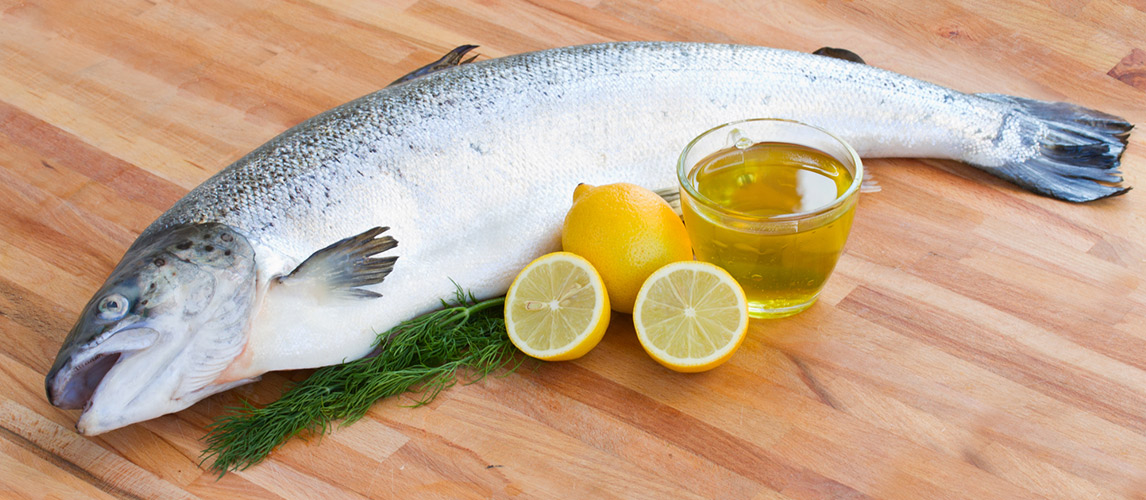Fish oils can provide health benefits to our dogs including, but not limited to, healthier skin and coat, better immune system, reduced inflammatory process, better cardiovascular health, and improved nervous system functioning. Because these can truly help improve the overall health and wellness of our canine friends, it is essential that we know how to provide them with the best fish oils. However, with so many competing brands in the market it’s so easy to pick one that doesn’t contain the right amounts of polyunsaturated fatty acids that our pets need or, worse, a product that is tainted with harmful ingredients. That’s why we embarked on this project to bring to you only the safest, most effective, and consumer-trusted fish oil for dogs.
The 6 Top-Rated Fish Oils For Dogs
1 Amazing Nutritionals Chewable Fish Oil For Dogs
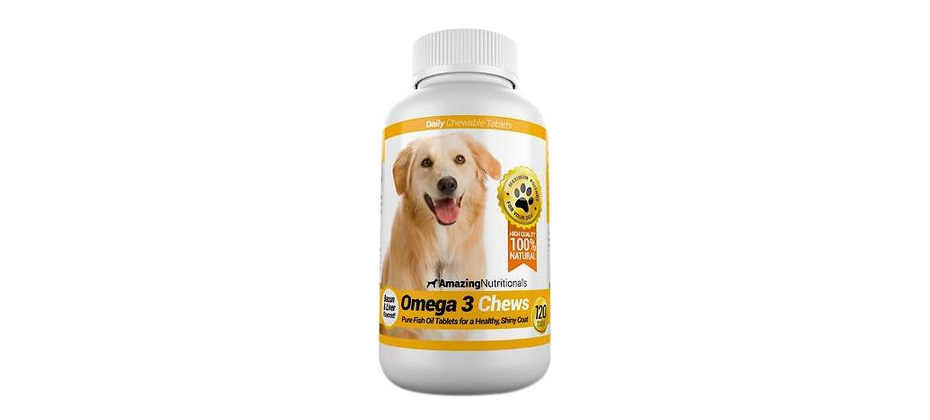
Looking for omega 3 for dogs should not be really that difficult as every pet store actually displays a dizzying array of various brands. But if you’re looking for one of the best, you’ll definitely reach for the Amazing Nutritionals, certified to be composed of only organic, all-natural ingredients, these fatty acids for dogs in chewable tablet form are very easy to administer, minimizing, if not eliminating, wastage which is a common occurrence in liquid formulations.
A serving of Amazing Nutritionals consists of 3 tablets. Each tablet contains 50 milligrams of fish oil and completed with 17 milligrams of sunflower oil to provide a ratio of roughly 3:1 omega-3 to omega-6. It also contains about 33 milligrams of omega-9 fatty acids in the form of primrose oil. These fatty acids help provide the Amazing Nutritionals with an exceptional profile when it comes to promoting healthier and shinier coat in your mutt while also encouraging the continuing development of healthier bones, joints, and nervous system.
The chewable tablets are flavored in bacon and liver which will surely make it a delicious treat to your pooches. The Amazing Nutritionals fish oil for canines also boasts of being manufactured from a GMP-certified facility so you can feel a lot safer about its quality and safety. It also promises noticeable difference in your pooch in 30 days or they’ll return you money.

2 Finest For Pets Omegease Omega-Rich Fish Oil
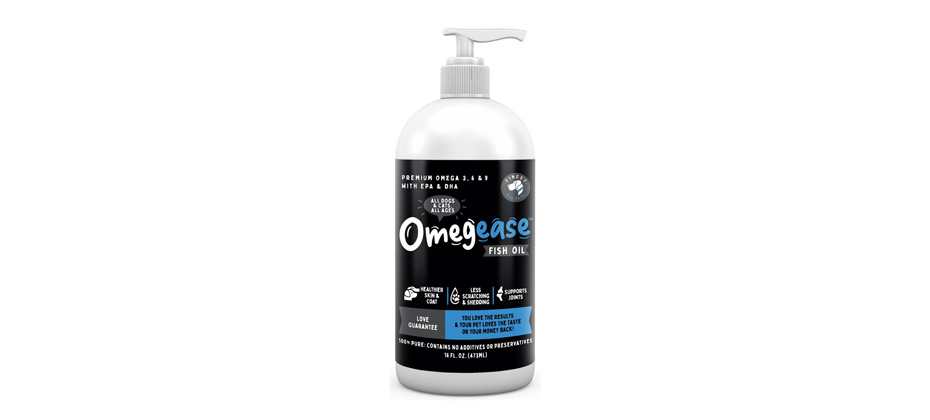
Omegease is inherently formulated by dog-loving pharmacist who happens to have a Golden Lab that’s been suffering from stiff and painful joints for a long time. Instead of relying on pharmaceutical products that only mask the pain, he devised an all-natural formula that will help his Golden recover from its condition. The result is the Omegease Omega Rich Fish Oil. Unlike Amazing Nutritionals, however, Omegease comes in liquid form which you will need to mix with your pet’s food. Unfortunately, if your pet doesn’t eat its prepared meal, then you are facing possible fish oil wastage. Forcing the Omegease into your pet’s mouth may not help either as some of it may drip from the corners of the mouth. Nevertheless, these are issues that may or may not really be deal-breakers.
What’s amazing about the Omegease dog fish oil supplements is that it has unusually larger amounts of eicosapentaenoic acid (EPA) and docosahexaenoic acid (DHA) at about 160 milligrams and 105 milligrams per milliliter, respectively. Its omega-3 acids are sourced from wild-caught, premium sardines, mackerel, herring, and anchovies. Omegease also contains omega-6 fatty acids and omega-9 fatty acids. This combination makes the Omegease an exceptional product for soothing dry and itchy canine skin leading the less frequent shedding and scratching. It also helps facilitate shinier, softer, and healthier coat while also easing stiff, almost immovable, joints, reducing inflammation, and alleviating pain. Finest For Pets also provide a 30-day guarantee for Omegease.

3 Zesty Paws Pure Wild Alaskan Salmon Oil For Dogs
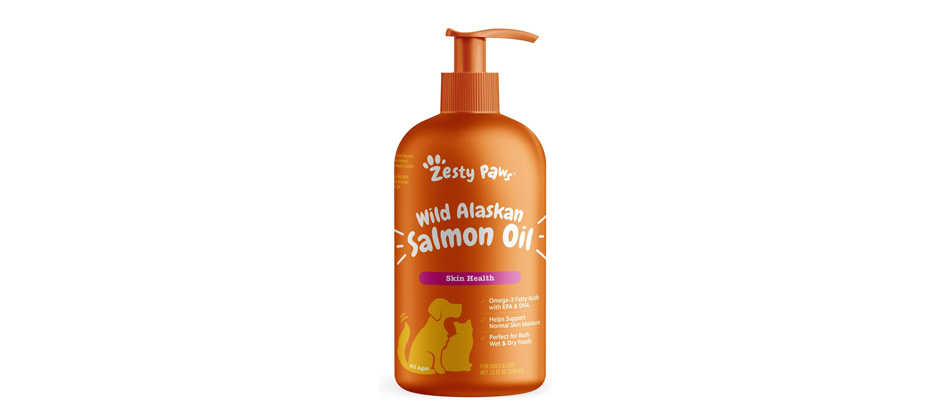
Salmon remains one of the world’s best sources of omega-3 essential fatty acids especially those found in colder waters because of the abundance of phytoplanktons which are one of two principal sources of omega-3 fatty acids. Zesty Paws managed to put all the health-giving benefits of omega-3 fatty acids into its Pure Salmon Oil omega 3 for dogs, giving your mutt up to 120 milligrams of EPA and 130 milligrams of DHA per gram or milliliter of its formulation. According to the product information on Zesty Paws, it only has one ingredient: salmon oil. This should be welcome news for those who despise the idea of having too many ingredients in one product that, should there be a reaction to their dogs, the identification of a possible trigger becomes difficult.
Zesty Paws is also made available in liquid, chewable tablet, and soft gel preparations so you will have the versatility of choosing which one is a lot easier to administer to your pet. The liquid formulation can be easily mixed with your mutt’s food and comes with a nifty table for determining the amount of Zesty Paws you need to give on a daily basis depending on the weight of your mutt. The same is true with its tablet and soft gel preparations. Zesty Paws provides a helpful tool for determining the number of tablets or soft gels you need to give. One note, however, is that the Zesty Paws tablet and soft gels come with additional ingredients to help ensure the integrity of the solid formulation. Not to worry though as these are considered safe.

4 Grizzly Pollock Oil Omega-3 Fatty Acids For Dogs
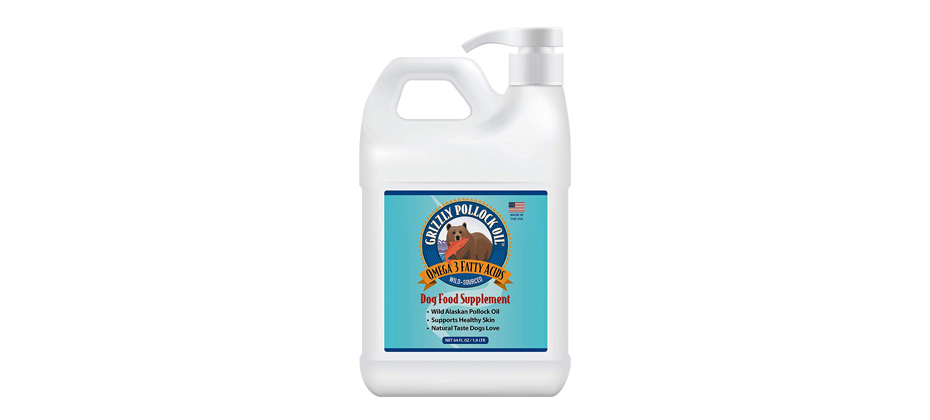
For those who are looking for alternative sources of omega 3 for dogs, the Grizzly Pet Pollock Oil Food Supplement is a good choice. Instead of the usual salmon, mackerel, herring, or tuna, the Grizzly comes with Pollock oil that’s been sourced from wild Pollock. These white fish, although they have lower concentrations of fatty acids compared to fatty, cold water redfish, have significantly higher DHA level which is important for improving the overall functioning of the nervous system while also promoting healthier, shinier, and softer coat and ensuring well-hydrated skin. It also contains significant amounts of EPA although this is usually lower than redfish. Technically, if you’re looking for a product that will help your dog manage its inflammatory conditions, you might want to look for something with a higher concentration of EPA
The Grizzly Pollock Oil is nevertheless, an exceptional choice if you only need to promote and maintain a healthier coat for your pooch. The Grizzly can be easily mixed into your mutt’s chow. Unfortunately, some users commented on the Grizzly’s distinct “fishy” smell. While this may likely put you off, it’s a great treat to pooches.

5 Grizzly Salmon Oil All-Natural Dog Food Supplement
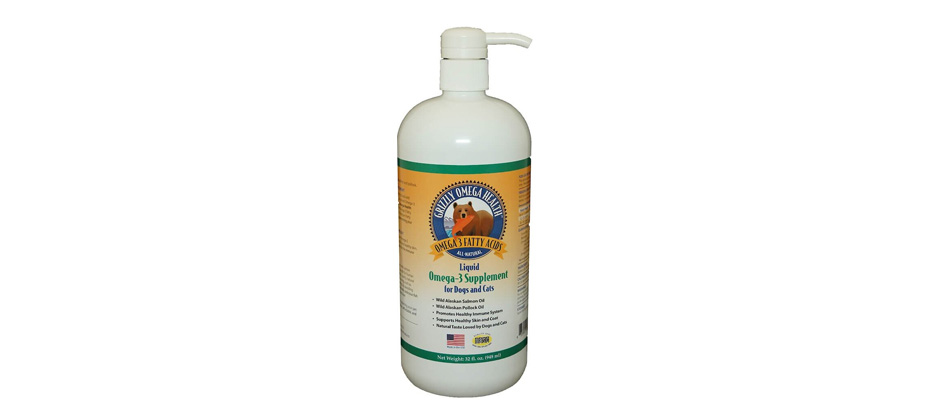
Definitely one of the most popular fish oil supplements for dogs, the Grizzly Pet Salmon Oil not only provides exceptional amounts of EPA and DHA in its formulation, it also provides 13 other fatty acids to give your pet a range of health benefits that may not be provided by other products. The main difference between this Grizzly Pet product and the one above is that it’s essentially sourced from wild Alaskan salmon with greater concentrations of ω-3, ω-6, and even arachidonic fatty acids. You won’t be getting any other ingredient from this Grizzly except the world-famous Alaskan salmon, known for its rich concentrations of essential fatty acids to help ensure optimum health for your pet’s skin and coat.
More importantly, however, is that the Grizzly Salmon Oil provides a wider range of health benefits including a boost in your mutt’s immune system functioning, cardiovascular health, and central nervous system functioning. Of particular importance is its effect on inflammatory conditions. Because salmon has greater amounts of EPA, its anti-inflammatory effects can be readily observed.

6 NaturVet Omega Gold Plus Salmon Oil Soft Chews
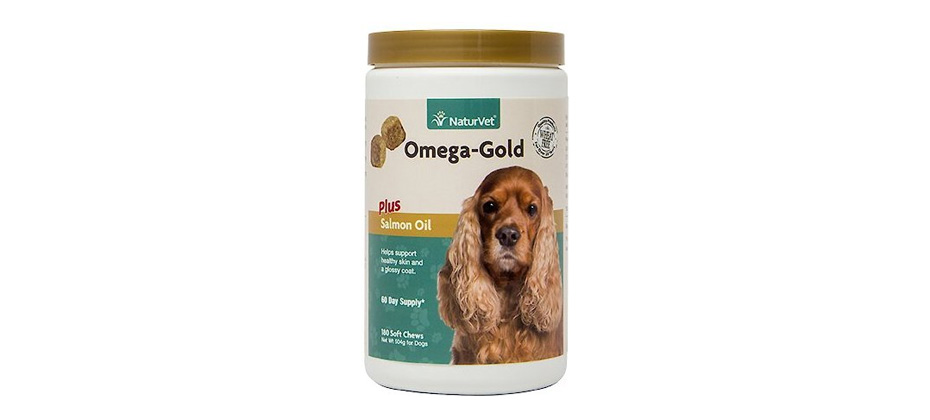
You know that ω-3 fatty acids are not only composed of EPA and DHA, it also contains ALA or alpha-linolenic acid which essentially comes from plant sources. That being said, if you want more complete essential fatty acids for dogs, the NaturVet’s Omega-Gold should be a wonderful choice. It contains EPA and DHA as well as AHA and ω-6 polyunsaturated fatty acids. Its ALA is sourced from flaxseed which is world-renowned for having the best source of this type of fatty acids. It has antioxidant properties which should work exceptionally well with EPA’s anti-inflammatory properties. Together, the combination can lead to healthier joints and cardiovascular system, although Omega-Gold is primarily indicated for improving the coat and skin of your pooch. This is perhaps because it has substantially greater amounts of ALA and DHA than EPA.
Just like Amazing Nutritionals, NaturVet provides its dog fish oil pills in soft chewable form, making it exceptionally easy to administer. Each soft chew contains approximately 150 milligrams of ALA, 13 milligrams of EPA, 16 milligrams of DHA, and 42 milligrams of omega-6 fatty acid in the form of linoleic acid. For those who may be skeptic about the company’s manufacturing capabilities, NaturVet prides itself of being FDA-audited as well as fully compliant with cGMP standards.

Best Fish Oils For Dogs: Buying Guide
Fish oils are just one of the many food supplements that have been shown to provide a variety of health benefits. It is very important to understand that supplements should never be considered as therapeutic agents or substances that can treat or cure diseases, whether human or canine. Supplements are called as such for the simple fact that the ingredients contained in these products are actually found in natural food. The only problem is that we are not giving our pets the right kinds of food that contain these essential substances. That’s why we need to supplement them. But, if you’re going to think that fish oils will cure your pet’s arthritis, it will not. It may only relieve the symptoms such as pain and swelling but it will never really address the root of the problem. Palliative treatment is not a permanent cure. It only relieves the symptoms so your pet can go about its usual business. It is important to understand this before you give your pet any type of supplement, fish oils included.
With that out of the way, we can now go to the more important reason why you’re here – how to determine the right fish oil supplement for your dog. The answer to this question is not very straightforward, unfortunately. It is best to understand some of the basics first so you will have an idea of the things you need to look for in the right fish oil for dogs.
What are Fish Oils?

As the term implies, fish oil is a type of fat that is derived from fish. In common usage, it almost always refers to eicosapentaenoic acid (EPA) and docosahexaenoic acid (DHA) that have been extensively studied in many clinical trials for their supposed benefits in reducing the signs and symptoms of inflammation as well as improving blood lipid problems, especially hypertriglyceridemia. It is worth noting that EPA and DHA are not the only essential fatty acids contained in fish oil. It also contains arachidonic acid and other types of oils.
Fish oil is found in all types of fish, although marine life that are considered to be fatty fish have exceptionally high levels of EPA and DHA. These fatty acids are not produced by these fishes, however. These substances are manufactured by smaller marine life such as phytoplanktons and algae. When these tiny creatures are eaten up by other fishes, their stored EPA and DHA essentially become part of the fish. As such, marine life that depend on algae and phytoplanktons have high levels of omega-3 fatty acids. Also, marine creatures that are located high up in the food chain like sharks, albacore tuna, tilefish, and swordfish have high levels of EPA and DHA. Regrettably, consuming these predatory creatures solely for their oils is not recommended since they contain high levels of mercury, chlordane, PCBs, and dioxin which are all toxic substances. As such, only the oils from marine life in the middle of the food chain are deemed safer to consume for their oils.
Here are the 10 best sources of fish oil:
- Herring
- Sardines
- Salmon
- Spanish mackerel
- Halibut
- Tuna
- Cod
- Flounder
- Pollock
- Anchovies
As we have already said earlier, shark, tilefish, and swordfish have high levels of omega-3 acids, too. However, because they are essentially at the top of the food chain, it is possible that they may contain harmful and toxic substances and not only beneficial fish oils so we have purposively left them out in this list.
Given that fish oils are excellent sources of EPA and DHA, it is also important to understand what these fatty acids can do for your pet.
Eicosapentaenoic Acid
This fatty acid is generally important in the promotion and maintenance of overall health. However, it is best regarded for its anti-inflammatory properties as well as the ability to improve cardiovascular functioning. What this means for your pooch is that EPA essentially helps reduce the incidence and severity of inflammatory conditions such as arthritis and even muscle spasms. It should also help provide for a healthier heart, facilitating the enhanced delivery of oxygen and nutrients to the rest of your pet’s body. Sadly, EPA cannot be stored in significant quantities and, as such, should be replenished.
Docosahexaenoic Acid
Better known as the brain fatty acid, docosahexaenoic acid or DHA is particularly useful in the promotion of optimum eye and brain development and is important for supporting optimum heart health. You can say that DHA helps EPA in promoting a healthier cardiovascular system. Additionally, DHA can also help in regulating inflammatory processes, although not that significant compared to EPA. The good thing about DHA is that it is efficiently stored in the retina of the eyes and the different structures of the brain. It is perhaps for this reason that DHA in most supplements is relatively lesser than EPA in amount.
Does My Dog Really Need Fish Oil?

With all that talk about how EPA and DHA can be helpful in maintaining a normally functioning canine body, the question remains. “Does my dog really need fish oil?”
The answer is yes and no. Actually, the answer is quite complicated. And, it all depends on what you’re feeding your pet.
Can you remember what we said about supplements being not medicines at all but rather substances that are supposed to support normal functioning of the body which should have been the function of food? Well, most of the food that we feed our dogs today contains a lot of omega-6 fatty acids. Don’t get us wrong but omega-6 fatty acids are beneficial, too. Unfortunately, they’re a very complicated bunch since some of the molecules that are classified as omega-6 have anti-inflammatory properties while others have pro-inflammatory activities, meaning they promote inflammation.
Now, don’t ever think that inflammation is necessarily bad. Inflammation is actually the body’s own way of managing tissue injury. Without inflammation, the tissue injury will not be properly addressed. The thing, however, is that inflammation typically has its lifespan. When it extends well beyond what is considered to be physiologically beneficial, then problems can arise.
The issue is that most of the dog food that we give to our pets, especially commercially prepared diets, are filled with a lot of omega-6 fatty acids. Just to give you a reference point, humans today have an omega-6/omega-3 ratio of 15-17:1 which means we are way over the recommended ratio of 3-4:1. That is why we have a lot of inflammatory conditions from heart ailments to arthritis to cancer and a whole lot more. Likewise, current formulations of dog food are filled with a lot of omega-6 fatty acids in that these have been show to produce a ratio of 8-10:1.
Considering that majority of omega-6 fatty acids promote inflammation, particularly arachidonic acid, which has been shown to mediate inflammatory reactions, the type of food that we give to our pets can seriously negate the anti-inflammatory properties of omega-3 fatty acids.
So, does your pooch really need fish oil? If you’re feeding your pet with food that is sufficiently high in omega-6 fatty acids or your pet is showing a lot of inflammatory conditions, giving it fish oil should be a sound move. However, if you’re feeding your pooch biologically appropriate raw food that is naturally rich in omega-3s, there clearly is no need for fish oil supplementation.
Check Out Salmon Oil for Dogs.
What are the Benefits of Fish Oil for Dogs?
By now it should already be clear that fish oil can provide a variety of benefits for your pooch. If these are not yet that clear to you, here are the benefits of fish oil for dogs.
Promotes Greater Mobility
Because the EPA in fish oil has excellent anti-inflammatory properties, aided by the modest anti-inflammatory action of DHA, giving your pooch fish oil can help improve its overall mobility by preventing inflammation in the joints. Arthritis in dogs, especially large breeds and senior mutts, is a very common occurrence. While it doesn’t actually treat arthritis and other joint problems, fish oil can nevertheless, minimize the severity of such inflammatory conditions, if not downright prevent it from occurring. With uninflamed joints, your pooch will be able to move a lot better, allowing it to run, jump, and play with you and the rest of your family.
Aids in Obedience Training
The DHA contained in fish oil is primarily responsible for optimum brain development. What this simply means is that the different connections in the brain function at a more optimized levels. This helps in canine cognition, enabling them to process more information at the same time. And if you’re in the process of training your pooch to obey your commands, it would really be a great help if you could provide them foods that are rich in DHA or even give them fish oil supplements as this can help improve their memory.
Promotes Optimum Skin and Coat Health
The anti-inflammatory properties in the essential fatty acids contained in fish oil are what are responsible for the promotion of healthier skin and coat in canines. These substances are important components of the membrane of skin cells, maintaining its integrity. Without these fatty acids the skin can get easily irritated leading to intense itching and a variety of other symptoms such as redness or even blotching. Giving fish oil replenishes these fatty acids found in cell membranes making your pooch’s skin more resistant against insults which can trigger the inflammatory response. This minimizes scratching and prevents cuts through the skin which can become entry points for microorganisms leading to infection. The same is true with canine hair. Each hair shaft, while composed of keratinized tissues, is dependent on fatty acids to give it a shinier appearance and a smoother feel. It also helps minimize shedding.
Promotes Optimum Immune System Functioning
There’s a growing body of evidence supporting the role of DHA in enhancing the activity of B-lymphocytes which are primarily responsible for the production of antibodies. B-lymphocytes are also known to release cytokines which are very important in the management of infection, inflammation, and even cancer. Some of the more popular examples of cytokines are interferons, tumor necrosis factors (TNF), and interleukins. These can have wide-ranging effects on your pet, but the bottom line is that these greatly improve the overall functioning of its immune system. This helps your pooch fight infections a lot more effectively because of the combination of antibodies and cytokines regulated by the B-lymphocytes. Do take note that fish oil only enhances the activity of B-lymphocytes and not necessarily produce them.
Boosts Cardiovascular Health
Studies have shown that supplementing with fish oil doesn’t necessarily lead to a reduction in the incidence of heart attacks and strokes. However, it does provide some protective mechanism through the anti-inflammatory and antioxidant action of EPA and DHA. More importantly, however, is the effects of omega-3 fatty acids on low-density lipoproteins which can help minimize the risk of developing atherosclerotic conditions. The good news is that dogs are not really that susceptible to cardiovascular conditions compared to humans. However, this doesn’t necessarily mean that they don’t.
How Do I Choose the Best Fish Oil for Dogs?

You now have an idea what fish oil is all about and why your dog may need it or not as well as the benefits it may provide for your pet. The next question, and perhaps the most important one, is how to choose the right fish oil for dogs. Regrettably, there are no simple answers to this as everything depends on how well you understand the health needs of your pet. Regardless, here are some tips to choosing the right fish oil for your pet.
Consider the EPA and DHA Concentrations of Your Product
Some products put emphasis on the DHA component of their fish oils. However, going back to what we already said about DHA, increasing this component is not necessarily beneficial unless your ultimate goal is to improve the brain and eye functioning of your pooch. Even then, we also know that DHA can be easily stored by your pet’s body in its brain and eyes so giving it more DHA may not really serve its intended purpose.
Experts all agree that EPA is a more important consideration when it comes to fish oil supplementation for the simple fact that it cannot be stored in the body. As such, supplementing it with fish oil is a must. Plus, its anti-inflammatory properties are well-recognized and duly established. And since many of the health conditions besetting dogs today are inflammatory in nature, it would be best to get a product that has naturally higher concentrations of eicosapentaenoic acid. Of course, if you already get EPA, then DHA follows.
To help you better decide, here are some of the omega-3 fatty acid blends that are currently available in the market:
- Sardine, mackerel, anchovy, and herring blends – These typically contain the highest concentrations of EPA and DHA at 18% and 12%, respectively.
- Salmon oil – More often than not, the salmon oil you may have in your product is sourced from farmed salmon. Know that farmed fish are typically fed with antibiotics as well as unnatural commercial diets. So, you have to make sure that the fish oil is sourced from salmon caught in the wild. This should give you an EPA and DHA concentrations of 10% and 11%, respectively.
- Pollock oil – Like salmon oil, make sure the label reads “caught in the wild” to make sure that it is safe and that your dog will be getting as much as 12% DHA and 6% EPA. You read that right. This is one of the major advantages of Pollock oil as it comes with higher concentrations of DHA than EPA.
There are other sources of omega-3 fatty acids that you might be interested in. Understand, however, that these are not considered fish oil. These include cod liver oil, which has 9% EPA and 11% DHA, and krill oil, which has 11% EPA and 5% DHA. Know that if you choose cod liver oil, this product is often included with Vitamin A and Vitamin D. Since these vitamins are fat-soluble vitamins, they do have the tendency to stay in your pet’s system a lot longer. If you continue giving the, cod liver oil, they may develop toxicities related to an oversupply of these 2 vitamins.
You may also like our article on Salmon Dog Food.
Go for Fish Oil Whose Sources are Caught in the Wild
We already said that fish that have been farmed are generally not safe to consume primarily because of the fish-raising practices employed by these companies. Many fish farms use antibiotics, parasiticides, antifungals, and dyes as well as commercial diets that may be filled with many synthetic ingredients. Many are grown in polluted waters, are heavily vaccinated to increase their viability. Studies also show that many of the aquatic produce from fish farms contain alarmingly higher concentrations of mercury, PCBs, dioxins, and other toxins.
As such, you should really get a product that sources its fish oil from aquatic creatures in the wild. Now, be very careful as some products that are labeled ‘caught in the wild’ are not actually from the open seas but rather from hatcheries. While these are relatively ‘safer’ than those found in fish farms, they often contain less EPAs and DHAs because they do not have, or have limited, access to the primary source of these compounds – the phytoplanktons and algae.
Stick With ‘Real’ Fish Oils
There are products that come with omega-6 fatty acids in their formulation. Some even come with ALA. Alpha-linolenic acid is usually converted into EPA and DHA. Unfortunately, the body is not that efficient in converting this molecule for more useful purposes. Also, your pet’s food already has plenty of omega-6. Adding some more may not be a good idea if you want to secure a healthier omega-3/omega-6 ratio.
Choose the More Convenient Way of Administering the Fish Oil to Your Dogs
Fish oils are currently available in chewable tablets, liquids, and soft gel formulations. You simply have to choose the best and most convenient way of administering these to your dog. For some, soft gels are preferred as these can be mixed with food or incorporated in doggie treats. Liquid oils, on the other hand, can be quite messy especially if there are no pouring mechanisms. It can be easily mixed with food, though. Chewable tablets are often preferred for their doggie treat-like characteristics. Find out more about Dog Treats.
What is the Best Fish Oil for Dogs Dosage?

Identifying the correct amounts of fish oil to give to your dog is crucial. The good thing is that there is a very simple way of identifying how much EPA you should target for your pet. The general rule of thumb is to get your pooch’s weight in pounds and multiply this by 20. This should give you an estimate of how much EPA you need to give. As such, if you have a 15-pound pooch, multiply this by 20, and you get 300 milligrams of EPA. If a product is labeled as containing 150 milligrams of EPA per teaspoon, then you should give your mutt 2 teaspoons to account for its 300 milligram requirement.
How about DHA? Well, we already mentioned that EPA is given more emphasis in fish oils primarily because of its greater anti-inflammatory activity and the inherent inability of the body to store it efficiently.
Fish oils are needed by dogs especially if you’re feeding them diets that are naturally rich in omega-6 fatty acids or that your pet has an inflammatory problem. This balances the omega-6/omega-3 ratio to help promote normal cardiovascular, integumentary, immune system, and nervous system functioning. Choosing products that are essentially high in EPA, especially those sourced from marine life in the wild, can help ensure that your pet receives all the health benefits of fish oils.
Sources:
- JoAnna Pendergrass, DVM, What Are the Benefits of Fish Oil for Dogs and Cats?, PetMD

